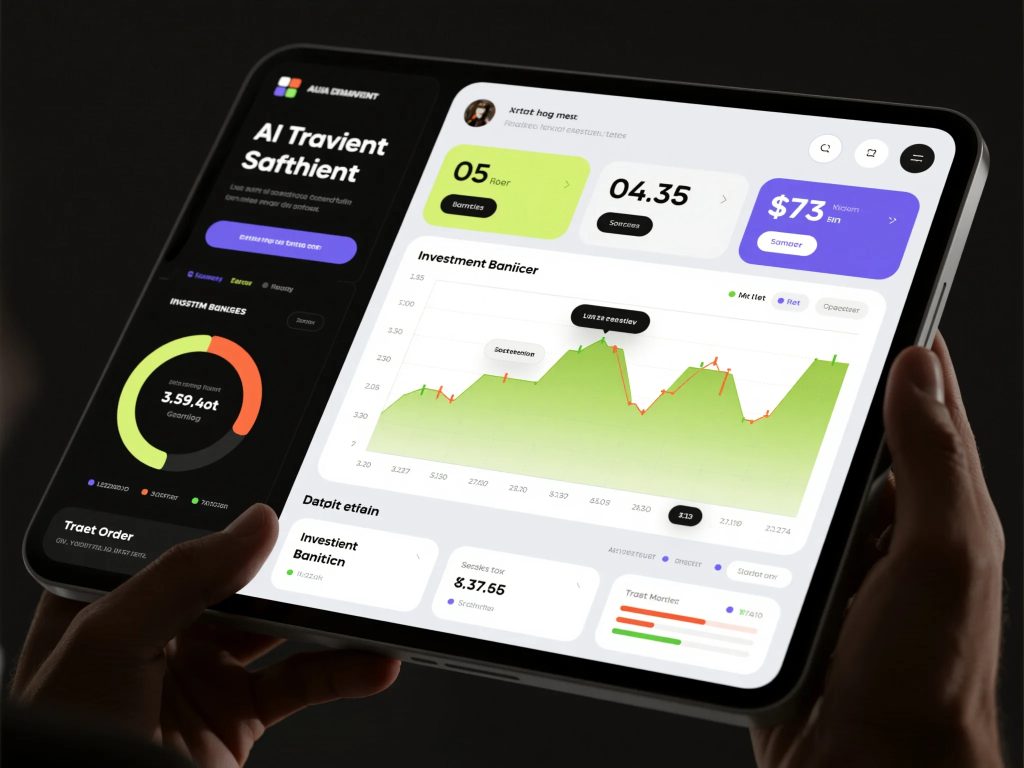The Transformative Impact of Artificial Intelligence on Trading Operations The integration of sophisticated artificial intelligence systems has fundamentally reshaped trading operations within investment banking, creating unprecedented levels of efficiency and accuracy that were unimaginable just a decade ago. These advanced technological solutions have moved beyond simple automation to encompass complex decision-making processes that analyze vast datasets, identify subtle patterns, and execute trades with precision timing
that human traders cannot match. The evolution of ai trading software represents one of the most significant developments in modern finance, enabling institutions to process millions of data points in real-time, from market movements and economic indicators to news sentiment and social media trends. This technological revolution has particularly benefited quantitative trading strategies, where AI algorithms can detect minute pricing inefficiencies and execute arbitrage opportunities across multiple markets simultaneously. The machine learning components embedded within these systems continuously improve their performance through experience, adapting to changing market conditions and refining their predictive capabilities without human intervention. For investment banks, the adoption of AI-driven trading solutions has resulted in substantially reduced transaction costs, improved execution quality, and enhanced risk management through more accurate forecasting and scenario analysis. The competitive advantage offered by these technologies has made them essential tools for institutions seeking to maintain leadership in increasingly efficient and fast-moving financial markets.Comprehensive Investment Banking Services in the Digital Age Modern investment banking services have evolved dramatically through the integration of artificial intelligence and advanced analytics, transforming how institutions serve their corporate and institutional clients. The traditional pillars of investment banking—mergers and acquisitions advisory, capital raising, and strategic consulting—have been enhanced through AI-powered tools that provide deeper insights, more accurate valuations, and improved transaction execution. In capital markets
activities, algorithms now assist in optimizing deal structures, pricing securities, and identifying ideal investor matches based on sophisticated pattern recognition and predictive modeling. The advisory side has been revolutionized through natural language processing systems that can analyze thousands of legal documents, regulatory filings, and market reports to identify risks, opportunities, and strategic options that might escape human detection. Client relationship management has been transformed through AI systems that track market developments, client needs, and potential opportunities, ensuring that banking teams provide proactive, relevant advice rather than reactive responses. Risk management capabilities have seen perhaps the most significant enhancement, with machine learning models capable of stress testing portfolios under thousands of scenarios, identifying potential vulnerabilities, and recommending appropriate hedging strategies. The integration of these technologies has not replaced human expertise but rather augmented it, allowing banking professionals to focus on high-level strategy and client relationships while algorithms handle data-intensive analysis and routine decision-making.Mezzanine Financing Enhanced by Advanced Analytical Capabilities
The realm of mezzanine financing solutions has experienced substantial innovation through the application of artificial intelligence and sophisticated data analytics, creating more efficient and accurate structuring of hybrid debt-equity instruments. These complex financing arrangements, which occupy the space between senior debt and pure equity, require careful assessment of risk-return profiles, covenant structures, and exit scenarios that AI systems are particularly well-suited to analyze. Machine learning algorithms can process historical data from thousands of similar transactions to identify optimal structuring approaches, appropriate pricing levels, and effective protective provisions based on specific industry characteristics, company performance metrics, and market conditions. The due diligence process has been transformed through natural language processing tools that can rapidly analyze legal documents, financial statements, and industry reports to identify potential risks and opportunities that might impact the investment’s performance. Portfolio management of mezzanine investments has been enhanced through predictive analytics that monitor company performance, industry trends, and economic indicators to provide early warning of potential challenges and opportunities for value creation. The exit planning process benefits from AI systems that can analyze market conditions, potential acquirer profiles, and IPO windows to identify optimal timing and approach for realizing investment returns. These technological advancements have made mezzanine financing more accessible and efficient while improving risk assessment and return optimization for both providers and recipients of this flexible capital.
Cross-Border Financial Operations in the Era of Intelligent Systems
The complexity of cross-border business finance has been significantly reduced through the implementation of artificial intelligence systems that can navigate the multifaceted challenges of international transactions. These sophisticated platforms integrate data from multiple sources—including currency markets, regulatory databases, political risk assessments, and economic indicators—to provide comprehensive analysis and recommendations for international financial operations. AI algorithms excel at identifying optimal currency hedging strategies, analyzing the impact of potential regulatory changes, and assessing country-specific risks that might affect cross-border investments or operations. The due diligence process for international transactions has been revolutionized through machine learning systems that can process foreign legal documents, financial statements in different accounting standards, and market reports across multiple languages to identify potential issues and opportunities. Transaction execution has been enhanced through algorithms that can optimize settlement timing across time zones, navigate different clearing systems, and manage counterparty risk in complex international deal structures. Compliance and regulatory reporting have been streamlined through AI systems that can monitor changing requirements across multiple jurisdictions, ensure adherence to diverse regulatory frameworks, and generate appropriate documentation for different regulatory bodies. These technological advancements have made cross-border finance more accessible, efficient, and secure, enabling businesses to expand internationally with greater confidence and better risk management.

Project Finance Advisory Enhanced Through Predictive Analytics
The specialized field of project finance has been transformed by artificial intelligence, with project finance advisory firms leveraging advanced analytics to improve the structuring, risk assessment, and management of complex infrastructure and industrial projects. These sophisticated systems analyze historical data from thousands of similar projects worldwide to identify optimal financing structures, appropriate risk allocation mechanisms, and realistic performance projections based on specific project characteristics and market conditions. The due diligence process has been enhanced through machine learning algorithms that can process technical reports, environmental impact assessments, and market studies to identify potential risks and opportunities that might affect project viability. Financial modeling capabilities have been revolutionized through AI systems that can run thousands of scenarios incorporating variables such as construction timelines, operational performance, commodity prices, and interest rates to identify potential vulnerabilities and optimize financial structures. Risk management has been significantly improved through predictive analytics that monitor project performance, market conditions, and external factors to provide early warning of potential issues and recommend appropriate mitigation strategies. The documentation and compliance aspects of project finance have been streamlined through natural language processing systems that can analyze complex contracts, ensure consistency across documents, and verify compliance with numerous regulatory requirements and covenant provisions. These technological advancements have made large-scale project financing more efficient, secure, and accessible, enabling the development of essential infrastructure projects worldwide.
Integration Challenges and Implementation Strategies
The successful implementation of AI systems within investment banking operations requires careful planning, significant resources, and strategic vision to overcome the substantial challenges associated with technological transformation. Financial institutions face numerous hurdles when integrating artificial intelligence into their existing operations, including data quality issues, legacy system compatibility, regulatory compliance requirements, and cultural resistance to technological change. The implementation process typically begins with comprehensive assessment of current capabilities, identification of specific use cases where AI can provide meaningful improvements, and development of a phased implementation strategy that minimizes disruption to ongoing operations. Data management represents one of the most critical challenges, as AI systems require large volumes of high-quality, well-organized data to function effectively, necessitating significant investments in data infrastructure, cleaning processes, and management systems. Talent acquisition and development present another major consideration, as successful AI implementation requires specialized skills in data science, machine learning, and computational finance that are in high demand across multiple industries. Regulatory compliance must be integrated throughout the development and implementation process, ensuring that AI systems operate within established guidelines, maintain appropriate transparency, and include necessary oversight mechanisms. Change management strategies are essential for addressing cultural resistance and ensuring that staff understand, accept, and effectively utilize new AI tools in their daily workflows. The most successful implementations typically involve close collaboration between technology experts, business leaders, and compliance professionals to create solutions that are technologically advanced, business-relevant, and regulatorily compliant.
Future Developments and Strategic Implications
The rapid evolution of artificial intelligence technologies promises continued transformation of investment banking services, with emerging capabilities likely to further enhance efficiency, accuracy, and value creation across all aspects of financial services. The convergence of AI with other technological developments such as blockchain, quantum computing, and advanced data analytics is expected to create new opportunities for innovation in trading, advisory services, and risk management. The development of more sophisticated natural language processing systems will enhance capabilities in document analysis, regulatory compliance, and client interaction, potentially enabling fully automated advisory services for routine transactions and queries. Advancements in predictive analytics will improve risk assessment, opportunity identification, and strategic planning, allowing investment banks to provide more proactive and valuable advice to their clients. The integration of AI with execution systems will continue to enhance trading performance, with algorithms becoming increasingly capable of understanding market context, anticipating movements, and executing complex multi-leg strategies across different asset classes and geographies. Ethical considerations and regulatory frameworks will continue to evolve alongside technological capabilities, requiring ongoing attention to issues such as algorithmic transparency, data privacy, and fair access to financial services. The competitive landscape within investment banking is likely to be significantly reshaped by these developments, with institutions that effectively leverage AI technologies gaining substantial advantages in efficiency, service quality, and innovation capabilities. Strategic planning for these future developments requires continuous monitoring of technological advancements, regulatory changes, and market expectations to ensure that institutions remain at the forefront of industry evolution while maintaining appropriate risk management and ethical standards.




